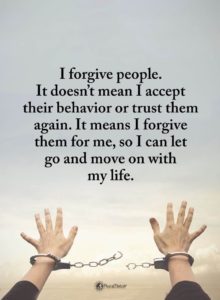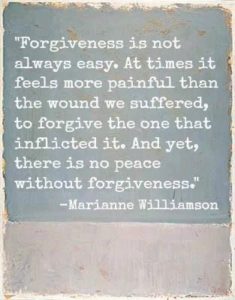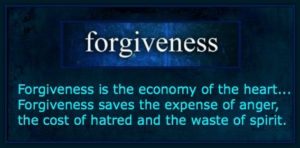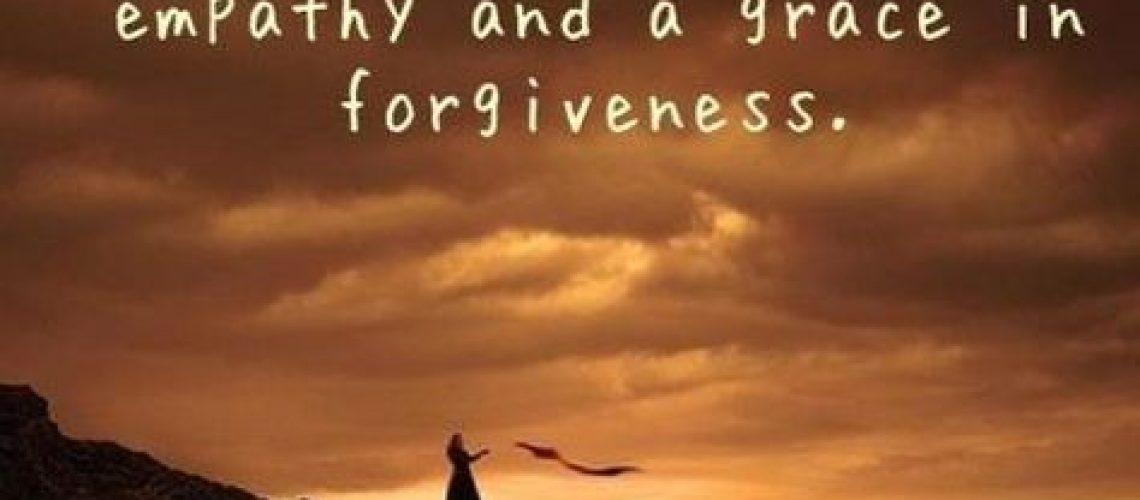 Every one of us finds ourselves at some point in time struggling with the issue of forgiveness, and particularly in giving it. The fact that we are not isolated individuals, but are inserted into community and society where we live and interact with other human beings makes it a real possibility of stepping on one another’s toes. Add to this complexity the fact that each of us is given the freedom to respond to our fellow human being in so many different possible ways increases exponentially the chances of misunderstandings, wrong or false perceptions and forms of social trauma. In these conflicting moments, when we experience hurt, forgiveness is the much-needed balm and healing salve. However, there is an almost in-built resistance towards applying it. If we spend some time sitting with the issue or issues at hand, it won’t be long before we arrive at one or more of the following reasons for our unwillingness to forgive.
Every one of us finds ourselves at some point in time struggling with the issue of forgiveness, and particularly in giving it. The fact that we are not isolated individuals, but are inserted into community and society where we live and interact with other human beings makes it a real possibility of stepping on one another’s toes. Add to this complexity the fact that each of us is given the freedom to respond to our fellow human being in so many different possible ways increases exponentially the chances of misunderstandings, wrong or false perceptions and forms of social trauma. In these conflicting moments, when we experience hurt, forgiveness is the much-needed balm and healing salve. However, there is an almost in-built resistance towards applying it. If we spend some time sitting with the issue or issues at hand, it won’t be long before we arrive at one or more of the following reasons for our unwillingness to forgive.
1. The person who offended me has not stopped the pain or hurt.
2, He or she still has not learned the lesson.
3. I still remember the incident vividly, and the pain is still there.
4. The person has not changed.
5. No apology has been offered.
6. I do not know how to forgive.
7. If I forgive, it will mean that I lost, and the other person won.
These are the main struggles which real people have with the issue of forgiveness. There are of course many other reasons but these readily come to my mind. Besides, I too, have found myself having some of these thoughts surging through my head when it was my turn to forgive those who have given me grief, distress or anguish in some form or other.
The Christian approach to forgiveness has a certain dimension that goes beyond just being “nice” so that we can “get along with one another in life.” If we are not aware of what needs to underlie all our efforts at working at forgiveness, it will be something that we will resist doing, and not be affected by the fact that we have stored unforgiveness and bitterness in our heart. What is it that should undergird our efforts at forgiveness as Christians? It is none other than LOVE. Christian scripture is redolent with verses that tell us to love our enemies. It does seem counterintuitive, does it not? Shouldn’t love be reserved for those who make life easy and sweet for us? Why should I be extending a hand in love to those who are only too happy to slap me on the cheek?
 When our forgiveness of others who have hurt us is only going to be given if they fulfill certain criteria like those I listed, it means that our forgiveness is conditional, and not unlike a quid pro quo settlement. But when forgiveness is based on love, it changes dynamically not only the way we forgive, but the mind and heart that goes behind the act of forgiveness. We will be responding to that call from God himself to love our enemies. But with what kind of love? The purest kind that is defined as agape love, where one wills the good of the other, for the sake of the other.
When our forgiveness of others who have hurt us is only going to be given if they fulfill certain criteria like those I listed, it means that our forgiveness is conditional, and not unlike a quid pro quo settlement. But when forgiveness is based on love, it changes dynamically not only the way we forgive, but the mind and heart that goes behind the act of forgiveness. We will be responding to that call from God himself to love our enemies. But with what kind of love? The purest kind that is defined as agape love, where one wills the good of the other, for the sake of the other.
Forgiveness is always going to be challenging once we attach any conditions to it because as human beings prone to sin, we are not very good at fulfilling this condition. This being the case, we are likely to injure the other person in the same (or similar) way at another point in time after this incident. Perhaps this is the reason why Jesus said to Peter that we need to not only forgive 7 times but 7 times 77 times. It was the Middle Eastern hyperbolic way of bringing home a truth – that forgiveness cannot have a limit in terms of the number of times I need to forgive others. But whenever I remember the incident, I feel the anger and the hurt welling up inside of me. What then? When that happens, it does not mean that you have not forgiven the person. What it most likely means is that you have a very good memory and that you have somehow made this issue or incident important enough to enshrine it in your life. You have put it in a nice glass cabinet in a prominent place in the living room of your heart, and each time this memory is brought to the fore, you have taken the trophy out of the cabinet, and cleaned and polish it again. “Then what should I do?” Well, when you feel the anger and hurt welling up in your heart, that is the time that you need to activate the forgiveness and apply it to the hurt and to the person whom you believe has caused it. If the hurt or the memory is triggered 5 times in a day, activate it each time. If it is triggered 7 times 77 times, activate it 7 times 77 times. We need to apply Jesus’ teachings in such a real way.
“But I cannot forget it!” Nowhere in the teachings of Christ nor in the Scriptures do we see that forgetting is part of forgiveness. It is something that has been toxically taught by society at large that we should forgive AND forget.
We have to remember: Forgiving is a virtue. Forgetting could well be a sign of dementia and is hardly associated with virtue. Rather, it is when we can remember but that we choose to forgive each time we activate our forgiveness that we become virtuous and godly.

Ultimately, forgiveness in the Christian sense, where we love our enemies, is going to be difficult because we are not ready to love in an unconditional way. We are so blessed to have in Jesus our role model of forgiveness when we look at images of him crucified on the Cross. That he said, while hanging there so innocently “Father, forgive them for they know not what they do” is such a model of unconditional love an icon of the love of one’s enemies.
The next time you find yourselves unwilling to forgive, perhaps even setting up conditions for forgiveness, check to see if you have a love for the one needing forgiveness. Chances are, you are going to find that you are running on empty in the love department, which is what fuels true forgiveness.
Remember, you do not forgive someone for his or her sake—you forgive them for your sake.
 Forgiving does not mean forgetting, nor does it mean that you have given the message that what someone did was alright. It just means that you have let go of the anger or guilt towards someone, or towards yourself.
Forgiving does not mean forgetting, nor does it mean that you have given the message that what someone did was alright. It just means that you have let go of the anger or guilt towards someone, or towards yourself.
#forgivenessischallengingformany #forgiveness
